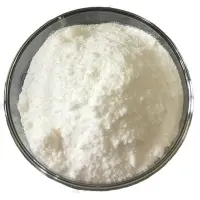-
Categories
-
Pharmaceutical Intermediates
-
Active Pharmaceutical Ingredients
-
Food Additives
- Industrial Coatings
- Agrochemicals
- Dyes and Pigments
- Surfactant
- Flavors and Fragrances
- Chemical Reagents
- Catalyst and Auxiliary
- Natural Products
- Inorganic Chemistry
-
Organic Chemistry
-
Biochemical Engineering
- Analytical Chemistry
-
Cosmetic Ingredient
- Water Treatment Chemical
-
Pharmaceutical Intermediates
Promotion
ECHEMI Mall
Wholesale
Weekly Price
Exhibition
News
-
Trade Service
Diacerein is a pharmaceutical drug that is used to treat inflammatory bowel disease, rheumatoid arthritis, and other autoimmune disorders.
It is a small molecule drug that has been shown to have a high oral bioavailability, making it an attractive option for treating these types of diseases.
In recent years, the chemical industry has begun to explore the potential applications of diacerein in various industries.
One area where diacerein has shown promise is in the production of cellulosic biofuels.
Cellulosic biofuels are produced from plant material that is typically considered waste, such as corn stover, sugarcane bagasse, and wood chips.
These materials are converted into sugars through a process called pretreatment, which involves the use of enzymes to break down the cellulose into its component sugars.
Diacerein has been found to improve the efficiency of this pretreatment process.
By treating the plant material with diacerein before pretreatment, it has been shown to enhance the breakdown of cellulose, resulting in a more efficient conversion of plant material into sugars.
This can improve the overall yield of cellulosic biofuels and reduce the cost of production.
Another area where diacerein has potential applications is in the production of biodegradable plastics.
Biodegradable plastics are designed to break down into non-toxic compounds that can be naturally absorbed by the environment, reducing the amount of plastic waste that ends up in landfills and oceans.
Diacerein can be used in the production of biodegradable plastics by serving as a component of the polymer matrix.
By including diacerein in the formulation of the plastic, it can improve the biodegradability of the material and reduce the risk of plastic waste accumulating in the environment.
In addition to these industrial applications, diacerein has also been shown to have potential in the field of drug discovery.
It has been used as a lead compound in the development of new drugs, particularly in the areas of oncology and inflammation.
Diacerein has been shown to inhibit the activity of various enzymes and signaling pathways that are involved in the development and progression of cancer.
By targeting these pathways, diacerein has been shown to inhibit the growth and spread of cancer cells in vitro and in vivo.
Overall, diacerein is a promising compound with a wide range of potential applications in the chemical industry.
Its high oral bioavailability and ability to enhance the efficiency of various industrial processes make it a valuable tool for advancing the development of cellulosic biofuels and biodegradable plastics.
Its potential as a lead compound in drug discovery also suggests that it has the potential to play an important role in the development of new treatments for various diseases.
As research continues to progress, it is likely that diacerein will continue to play an important role in the chemical industry.







